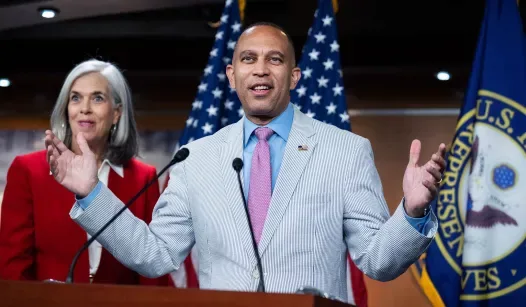In recent months, the Democratic Party has faced significant challenges in responding to the political landscape shaped by former President Donald Trump. One area that has drawn particular scrutiny is their reaction to the takeover of D.C. police by Trump supporters. Critics argue that the party’s response has been lackluster and unconvincing, raising questions about their political strategy and effectiveness in the current climate.
As the nation grapples with deep divisions and heightened tensions, it is essential for the Democratic Party to recalibrate its approach to politics. The events surrounding the Capitol riot on January 6, 2021, highlighted not only the fragility of American democracy but also the urgent need for a cohesive and assertive political strategy from the left. Many observers believe that Democrats have struggled to articulate a clear vision and respond effectively to the challenges posed by the Trump administration and its supporters.
The takeover of D.C. police during the Capitol riots was a moment that demanded decisive action and strong messaging from Democrats. However, the party’s response has often been perceived as reactive rather than proactive. This has led to frustration among party members and constituents who expect a robust defense of democratic values and institutions.
One of the critical issues at play is the need for Democrats to unify their messaging. In the past, the party has been characterized by a diverse range of voices and opinions, which can be both a strength and a weakness. While diversity of thought is essential in a democratic society, it can lead to confusion and mixed messages when the party fails to present a united front. In the face of aggressive tactics from the right, Democrats must prioritize clear communication and a cohesive strategy to counteract misinformation and rally support.
Moreover, the Democratic Party must also focus on grassroots engagement. While national messaging is crucial, the party’s success often hinges on its ability to connect with voters at the local level. Building relationships with constituents, understanding their concerns, and addressing their needs is vital for regaining trust and support. This grassroots approach can help Democrats reclaim the narrative and demonstrate their commitment to serving the American people.
Another aspect of the Democratic strategy that requires attention is the need for a more assertive stance on key issues. Many voters are looking for bold solutions to pressing problems, such as climate change, healthcare, and economic inequality. Democrats must not shy away from proposing ambitious policies that resonate with the electorate. By articulating a clear vision for the future and demonstrating a willingness to take action, the party can inspire confidence and mobilize support.
In addition to these strategic considerations, Democrats must also confront the reality of the current political environment. The rise of misinformation and the polarization of media have created significant challenges for political communication. Democrats need to be savvy in navigating this landscape, utilizing social media and other platforms to reach voters effectively. Engaging with younger audiences and leveraging technology can help the party amplify its message and counteract disinformation.
Furthermore, the Democratic Party must remain vigilant in defending democratic institutions and norms. The events of January 6 were not an isolated incident but rather a manifestation of a broader trend toward authoritarianism. Democrats have a responsibility to protect the integrity of elections, uphold the rule of law, and ensure accountability for those who threaten democracy. By taking a firm stand on these issues, the party can reinforce its commitment to the principles that underpin American democracy.
In conclusion, the Democratic Party is at a crossroads as it navigates the complexities of the current political landscape. The party’s response to the D.C. police takeover and other challenges has raised questions about its political strategy and effectiveness. To regain the trust of the American people, Democrats must prioritize clear messaging, grassroots engagement, bold policy proposals, and a steadfast commitment to democratic values. By doing so, they can reclaim their position as a formidable force in American politics and work toward a more equitable and just society.
